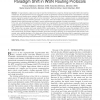125 search results - page 24 / 25 » Reducing Average Power in Wireless Sensor Networks through D... |
COMSUR
2011
12 years 6 months ago
2011
—In large networks, a data source may not reach the intended sink in a single hop, thereby requiring the traffic to be routed via multiple hops. An optimized choice of such rout...
IPSN
2010
Springer
14 years 1 months ago
2010
Springer
Current data collection protocols for wireless sensor networks are mostly based on quasi-static minimum-cost routing trees. We consider an alternative, highly-agile approach calle...
MASS
2010
13 years 4 months ago
2010
Wireless sensor networks typically conserve energy by following a periodic wakeup-sleep schedule: nodes minimize idle time and spend most of their time in a low power sleep state. ...
ICDCSW
2009
IEEE
14 years 1 months ago
2009
IEEE
Embedded wireless networks have largely focused on openloop sensing and monitoring. To address actuation in closedloop wireless control systems there is a strong need to re-think ...
BROADNETS
2004
IEEE
13 years 10 months ago
2004
IEEE
Channel-aware scheduling and link adaptation (LA) methods are widely considered to be crucial for realizing high data rates in wireless networks. Multi-carrier systems that spread...

